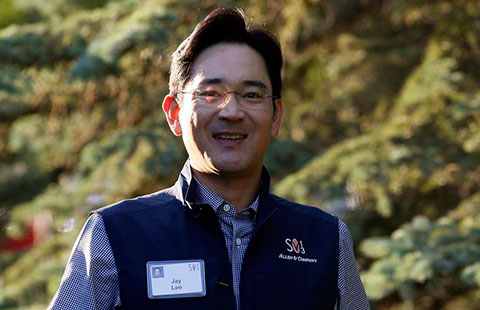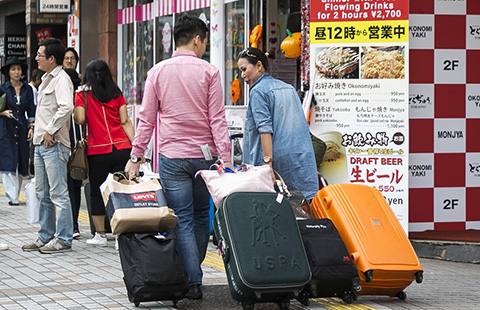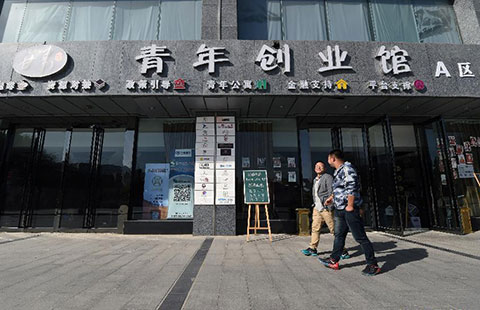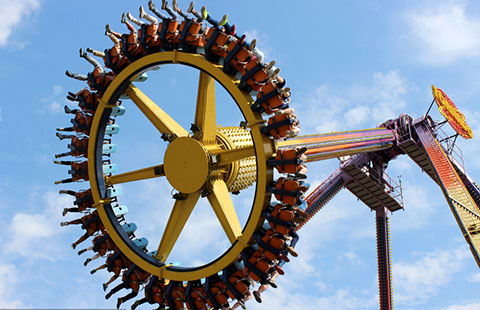Learning skills of a Western-style butler to serve the super rich
By MA SI (China Daily) Updated: 2015-10-13 07:27
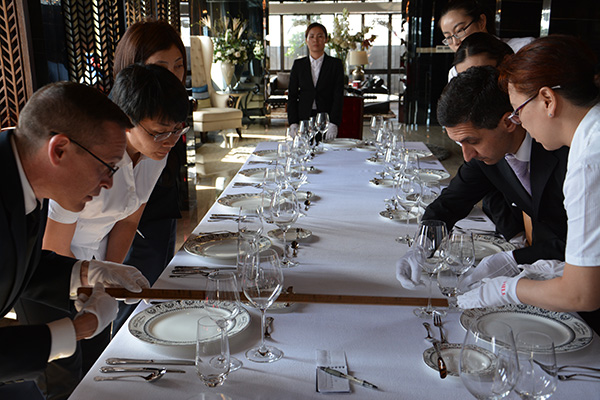 |
|
Butlers in training measure the precise distance between cutlery on a table at the International Butler Academy China, a foreign-run butler school in Chengdu. It opened last year, riding on the coat-tails of increasing demand for the trappings of European-style service in the country. [Photo/Agencies] |
One of them is the International Butler Academy, a Dutch institution, which opened a school in Chengdu, capital of Sichuan province, last year. The academy offers a six-week training program with enrollment fees of 40,000 yuan per person.
"China's service sector has failed to catch up with the country's breakneck economic growth," Pu Yan, who is in charge of marketing and public relations at the International Butler Academy, said. "Rich people are longing for better services and this brings huge opportunities for the butler market."
Chinese schools are also moving into the industry. Meiyu Home Service Coalition Organization Co Ltd, a service solution provider in Beijing, has linked up with Les Roches International School of Hotel Management, based in the canton of Valais in Switzerland, to provide courses.
The one month program costs 47,840 yuan and is split between Beijing and Switzerland. Courses include Western etiquette, international communication skills and event planning.
"The blending of training in two countries can help cultivate talent in China that meet international standards," Liu Yang, president of Meiyu Home Service, said.
Employing domestic staff in China is nothing new. During the time of imperial courts, employees were brought in to run the day-today royal household and look after foreign dignitaries.
But it is in the West where recent role models have come from such as Jules Verne's Passepartout and PG Wodehouse's Jeeves. Then, of course, there was Alfred from the Batman movie franchise.
Yet, the one that sticks out is Mr Carson, the head butler from the Downton Abbey drama series, which was made for television in the UK and now has a global audience.
"Downton Abbey is so famous here in China, that's the standard we are measured at," Thomas Kaufmann, the former head instructor at the International Butler Academy, told AFP news agency.
Still, unlike Mr Carson, most qualified butlers in China end up working in swanky hotels and exclusive private clubs. "We have seen the largest demand from five-star hotels, exclusive clubs and real estate companies," Fang Petersen, who runs The British Butler Institute's operation in China, said.
Xiao Feng is a potential client and hopes to use The British Butler Institute to train staff at his upmarket restaurant, Because of Love, in Beijing.
"A gap exists between China's catering service sector compared to Western countries," Xiao said. "Schools that are producing butlers will accelerate our efforts to make up for this deficiency.
"On the whole, people working in the service industry in China tend to be passive. They only do what guests ask them to do. But British butlers will prepare everything in advance and they are obsessed with details."
Real estate companies are also tapping into the market. As competition intensifies in the property sector, "promising a butler service is becoming a prerequisite rather than a bonus to sell a villa", one source, who wished to remain anonymous, said.
But there are still challenges to overcome if the industry is to expand into the "private butler" sector, even though international schools are starting to include courses in Chinese cuisine and the art of tea-making.
"It is still relatively difficult to offer a home butler service in China due to the lack of trust," Petersen, at The British Butler Institute, said. "Rich families rarely hire strangers to take care of their houses."
Cultural aspects also play a key role, according to Pu at the International Butler Academy. "Clients and butlers are supposed to be very intimate," she said. "Chinese clients are particularly strict when hiring butlers."
So far, the academy's Chengdu branch has trained only two butlers that have found positions with rich households. Part of the problem is that many Chinese clients are unsure what the duties of a butler should be.
Some simply treat them as nannies to look after their children or use them to greet guests.
"Clients usually live in big houses covering 1,000 to 2,000 square meters," Yang Xueping, training director at Meiyu Home Service, said. "So, instead of performing very specific tasks, the key job for a butler is to lead a team of four to eight people to manage the household."
To solve these problems, schools and institutes have launched promotional programs on what a traditional European butler does. The British Butler Institute, for example, has put part of its training course on Taobao, a shopping platform owned by e-commerce giant Alibaba Group Holding Ltd.
"We hope to use the Internet to help more people learn about butler services," Petersen said.
- Former butler to the Iron Lady at your service in China
- Former royal butler opens the door to aristocracy
- Initiative looks to UK maritimes services
- Services industry has seen rapid development in Changsha county
- Financial Support Measures of Pudong New Area for Promoting Development of the Emerging Services Industry
- Services industry must improve, say guidelines
- Dell makes waves with $67b EMC deal
- Central bank to expand relending plan
- Policy moves lift stocks to 7-week high
- Robust foreign capital flows offer hopes of sustained economic growth
- Zhejiang sex toy maker to debut on new board
- Learning skills of a Western-style butler to serve the super rich
- Asia's top 10 richest families
- Implementation of 'Internet Plus' sees surging e-commerce growth
